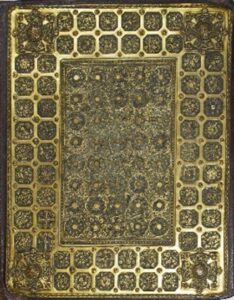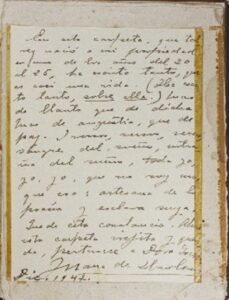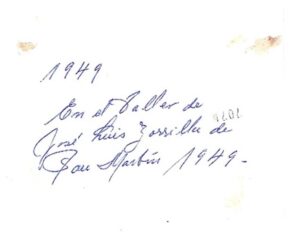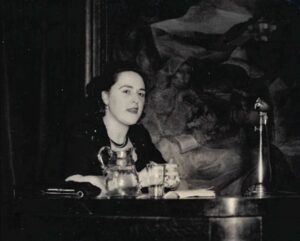The personal archive and library of Dora Isella Russell (Buenos Aires, 1925-Montevideo, 1990), writer, cultural manager, and secretary and friend of Juana de Ibarbourou (Melo, Uruguay,1892-Montevideo, 1979) was given to the Catholic University of Uruguay as a testamentary bequest by the author herself. The collection consists of handwritten and typed letters, documents, books (about two thousand volumes), postcards, photographs and some objects.
Among the latter is a leather folder (image 1), with a gold-embossed metal cover, which belonged to the poet and writer Juana de Ibarbourou (image 2), who gave the property to her friend Dora Isella, as stated in the handwritten note in her own handwriting (image 3), preserved inside and dated December 1947.
The note is significant for the intimate and confessional tone expressed by the writer, who declares herself to be an “artisan of poetry and its slave”. This gift shows the closeness and appreciation Juana de Ibarbourou had for Dora Isella, who was not only her disciple and friend, but also her secretary and editor.
Dora Isella belonged to a well-to-do social class, frequented the receptions of ambassadors and diplomats, and was in contact with great figures in the arts and literature of the time, such as Juana de Ibarbourou herself, the writer Carlos Sabat Ercasty, the philosopher Carlos Vaz Ferreira, the sculptor José Luis Zorrilla, the sculptor José Luis Zorrilla, the writer José Luis Zorrilla, the sculptor José Luis Zorrilla and the philosopher Carlos Vaz Ferreira, the sculptor José Luis Zorrilla de San Martín – son of the writer Juan Zorrilla de San Martín, author of the national epic, Tabaré – with whom he appears in his studio, in 1949 (image 4 and 5) or the great Catalan actress and theatre director, Margarita Xirgu (image 6). Since the publication of her first book of poetry, Sonetos (1943), she was particularly active in the 1950s and 1960s, when she gave lectures in Uruguay and Latin America, was a speaker at various events and tributes (image 7), and participated in the formation of the Asociación Uruguaya de Escritores (AUDE), whose first president was Juana de Ibarbourou, and Dora Isella, a founding member. In the late 1960s she was appointed director of the Sunday culture supplement of the newspaper El Día, a position she held until its closure in 1985. During the same period she also directed the Zorrilla Museum.
Dora Isella Russell’s personal archive and collection, through photographs, documents and correspondence, bear witness to an intense intellectual life and the richness of cultural exchanges in the second half of the 20th century in Uruguay and Latin America.
AUTHOR OF THE TEXT
Dr. Amalia Lejavitzer
BIBLIOGRAPHY
- Anderson Imbert, E. (1970). Historia de la literatura hispanoamericana (Vol. 2). Fondo de Cultura Económica.
- General Association of Authors of Uruguay (2000). Biographical catalogue of Uruguayan authors.
- Pickenhayn, J. O. (1994). The poetic work of Dora Isella Russell. Barreiro y Ramos.
- Riefkohl, G. (1982). The ways of love in the poetry of Dora Isella Russell.
- Sánchez, L. A. (1974). Historia comparada de las literaturas americanas. Losada.
- Torres Rioseco, A. (1972). Nueva historia de la gran literatura iberoamericana. Emecé.
NAME OF IBERARCHIVOS PROJECT
“Dora Isella Russell” first phase in the rescue, documentary treatment, digitisation for accessibility and dissemination of documents”.
Photographs:
- Carpeta de cuero con tapa metálica repujada en dorado, perteneciente a la poetisa Juana de Ibarbourou
- Juana de Ibarbourou sentada frente a su carpeta donde escribía. En el reverso, aparece escrito a lápiz 1941
- Nota manuscrita de puño y letra de Juana de Ibarbourou que se conservó en el interior de la carpeta. En la nota la poeta cede la propiedad a su amiga Dora Isella, fechada en diciembre de 1947
- Dora Isella Russell y el escultor José Luis Zorrilla de San Martín en su taller, ubicado en el barrio montevideano de Punta Carretas, junto a la casa paterna, en 1949. En la imagen se alcanzan a distinguir algunos bocetos de José Gervasio Artigas, prócer de la independencia uruguaya
- Nota al dorso
- La gran actriz y directora teatral catalana, Margarita Xirgu, en fotografía dedicada de su puño y letra a su amiga Dora Isella Russell, con “admiración y sincera amistad”, después de una función en 1961
- Dora Isella Russell brindando una conferencia. Ca. 1947-1950







